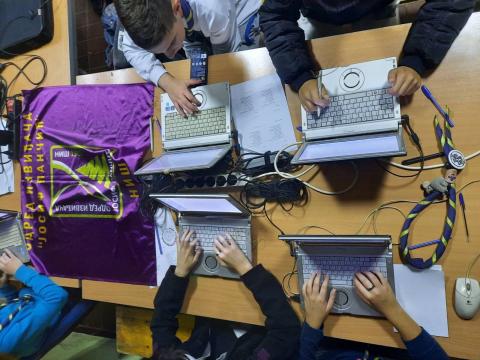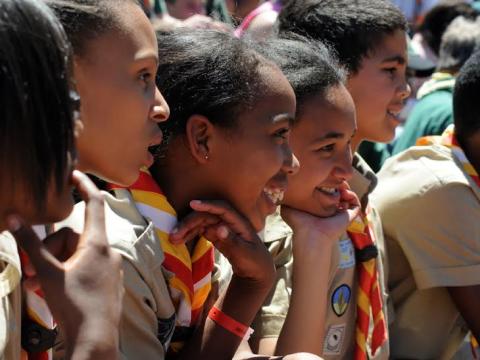Be safe during online events
Isn’t it amazing that Scout Groups, National Scout Organizations and World Scouting can host digital and hybrid events that are open to all, regardless of borders and timezones?
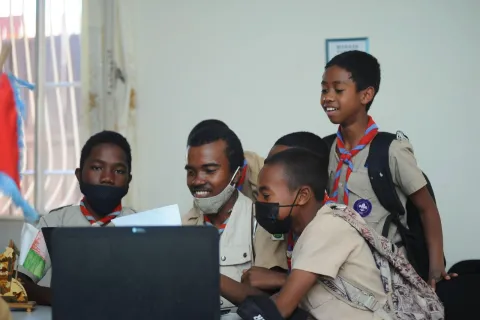
Online events are a great way of connecting people from all over the globe while developing our sense of global citizenship. For example, World Scouting brings young people together online and by radio every year for the Jamboree On The Air - Jamboree On The Internet (JOTA-JOTI), where we connect and learn from each other via global campfires, live shows, chatrooms, and more.
Online and hybrid events will only become more and more common in time. While there are many benefits to this, online events also come with a learning curve and new challenges as we seek to offer the most interactive, accessible, and safe digital experiences possible.
We always want to be prepared in Scouting, so let’s do our part and learn about safety for online events!
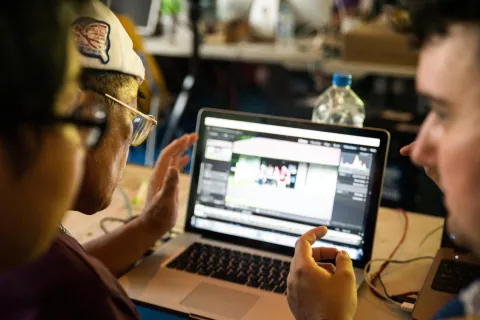
Playing your part for safer digital spaces
All adults involved in online Scouting events are accountable for the safety of children and young people throughout the event. That said, every person - including participants, staff, and volunteers - should be alert to stay safe and help keep others safe online.
Here are 5 quick S.M.A.R.T. Internet safety rules to keep in mind:
SAFE
Stay safe and cautious. Do not share personal information when you are chatting or posting online. Personal information includes e-mail address, full name, passwords, phone number, school name, and any other identifiable information.
In addition, never share any intimate or private images or videos, even with people that you consider friends. What goes online stays there forever - so only share what you would want to be public.
MEETING
Children and young people should never meet new friends online without supervision from their parents or caregivers. The reality is that we never know who is behind a screen. Online friends are still strangers, even if you have been talking for a long time.
It can be dangerous to meet someone in person when you have only been in contact online. Unfortunately, there are increasing issues with scams, catfishing, and predatory behavior online. In most cases, these occur when the person behind the screen pretends to be someone different. If you meet new friends online, always involve your parent or guardian, and only meet them - online or otherwise - when they are present.
ACCEPTING
Accepting or clicking on emails, messages, files, links, or pictures from unknown sources can be unsafe. These may come from strangers, but in many cases, they can come from people you know and trust via social media, text message, or e-mail, if they have had their accounts hacked.
Clicking on suspicious links or files can result in getting your information stolen, being hacked or impersonated, automated messages being sent to your family and friends (which can also put them in danger), and permanently losing access to your device(s) and/or vital accounts, like social media, e-mail or bank accounts.
RELIABLE
Today, anyone can post on the Internet, so you cannot rely on truthfulness from everything you come across. Misinformation is increasingly prevalent and can be used to mislead and manipulate people in very damaging ways.
To be a responsible citizen, it’s important to never share posts or information without verifying the source(s) or double-checking additional sources.
TELL
Tell your parents, caregiver, or a trusted adult if someone or something online makes you feel uncomfortable, threatened, or worried, or if you may be in trouble online.
Remember: A Scout is a friend to all, and speaking out to a trusted adult is vital to getting help and helping others.
Finally, remember that the Internet is always changing, so remember to brush up on safety knowledge regularly.
Ready to learn more? Take our Safe From Harm Online training.

Safer online event spaces
Just as with in-person events, all Scouting spaces should be safe spaces. While online events can unite us and provide opportunities to meet new people, share experiences and even create friendships, the reality is that you never know who is behind a screen.
That’s why, during online events, the host has safety responsibilities, including:
- Ensuring all staff and volunteers have completed their mandatory Safe From Harm training
- Setting age restrictions and guidelines on parental supervision
- Offering safety information and guidance, including implementing the World Safe From Harm policy
- Implementing a data protection and privacy policy
- Ensuring the presence of moderators in all chatrooms
- Having a policy against sharing personal data, and especially contact information, among people who have never met and don’t share mutual connections
- Implementing thorough reporting and investigation mechanisms for safety concerns or violations
- Taking reports seriously and addressing them as quickly as possible
- Communicating clearly with participants about safety rules and expectations, as well as resources and mechanisms available to them, on the event website, social media pages, and by e-mail.
The host must always do their best to reduce risks, particularly related to child and youth safety - including protecting children and young people from internet dangers like scams, catfishing, and grooming. The host must also ensure the protection of data and help educate participants about how to identify and respond to potential dangers online.
For examples of how to integrate Safe From Harm in online events, check out the Be Safe page for JOTA-JOTI.

Reporting safety concerns
We recommend doing three things to help when you experience or witness a concerning situation or violation online:
1. Take screenshots
When possible, take screenshots of troublesome online situations to help record evidence, including the user names of perpetrators, and relevant text, images, or videos. Make sure you know how to take screenshots on your computer, tablet, or phone so that you can quickly capture problematic situations if needed. This also ensures you have evidence if the perpetrator deletes messages or posts.
2. Talk to a trusted adult
Young people should never be alone in taking action over a situation that may be harmful to them or others. Always involve your parent or guardian in your online activities, and speak to them right away when you encounter an issue so they can support you. Don’t wait for the situation to get worse - some concerns can escalate very quickly, so it’s always best to check with an adult early on.
3. Report it to the relevant authority
During online events, you should additionally report your concerns directly to the event host. Include as many details as you know, like a description of the situation, the username of the perpetrators, the date and time the problem occurred, and screenshots.
If it’s a World Scouting event, look for the Safe From Harm section to make a report to a Listening Ear. Listening Ears are volunteers who are trained to speak with participants about concerns and take action on reports of safety issues.
If you encounter an issue on social media, we encourage you to use their built-in mechanisms (usually signaled with an exclamation mark next to a post) to report things like harassment, scams, hate speech, spam, violence, sexual activity, false information, and more.
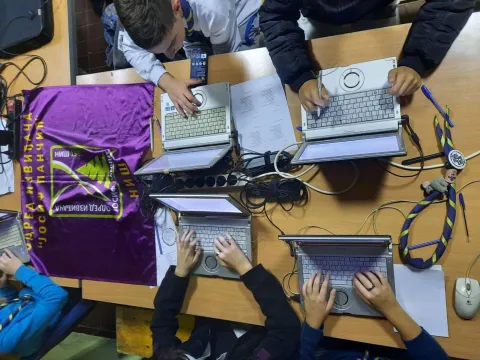
A better, safer world - online and offline
In World Scouting, we are responsible and committed to protecting children and young people, so everyone can feel safe at all times. With over 57 million Scouts in the world, we need everyone to be part of building safe environments, by learning, sharing, monitoring, and reporting concerns.
By doing this, we ensure that Scouts can continue to have fun and build a better world together, online and off.

P.S. Have you heard of Safe From Harm?
World Scouting has a dedicated Safe From Harm staff and volunteer team that not only develops resources, procedures, and guidelines for child and youth safeguarding and well-being but also ensures the protection of all thorough reporting mechanisms for all regional and world level events - online and offline. Learn more about our World Safe From Harm policy and guidelines.

